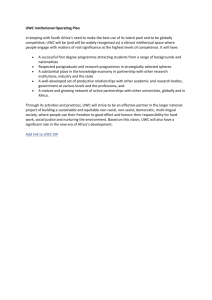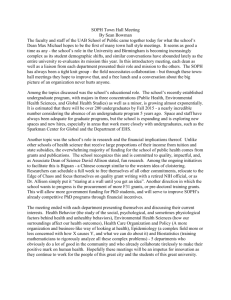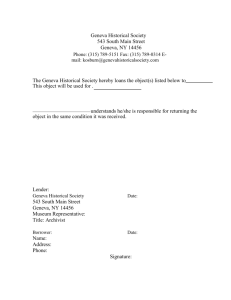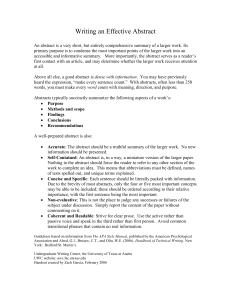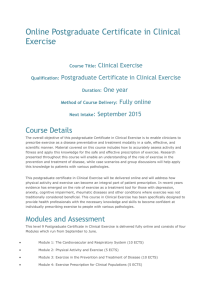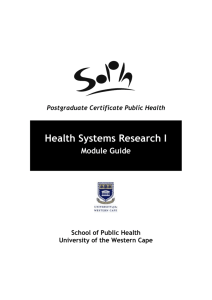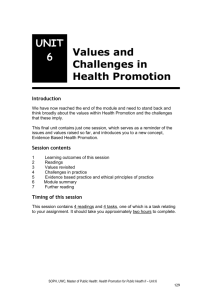Postgraduate Certificate in Public Health
advertisement
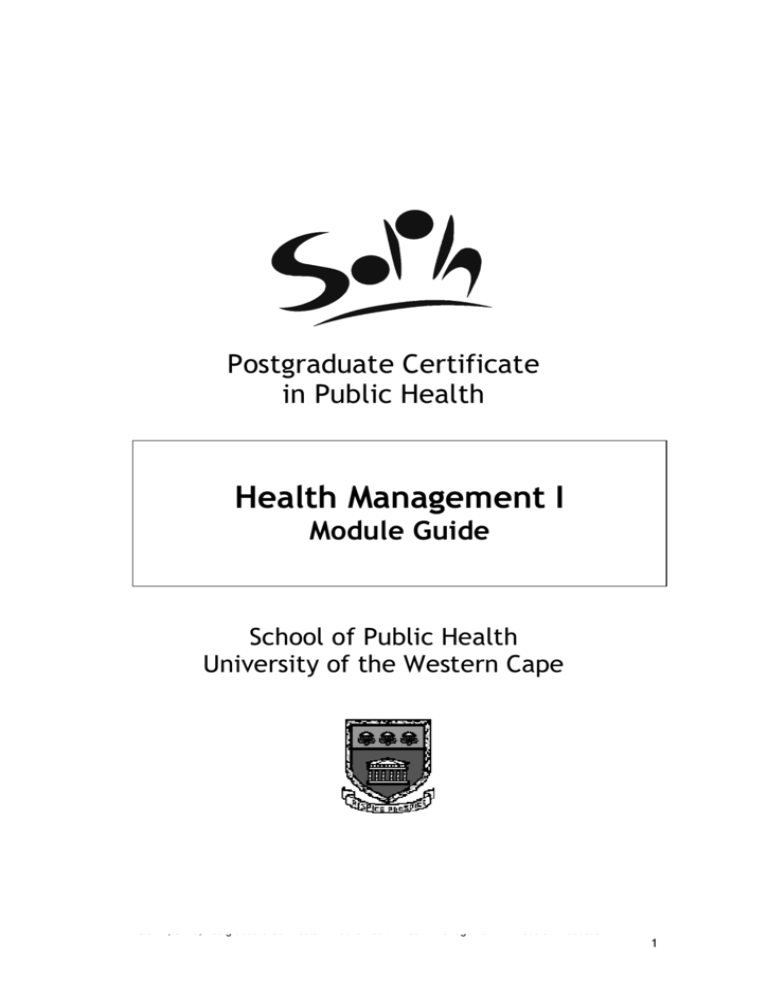
Postgraduate Certificate in Public Health Health Management I Module Guide School of Public Health University of the Western Cape SOPH, UWC, Postgraduate Certificate in Public Health: Health Management I – Module Introduction 1 Health Management I UWC Module Registration Number: 881538 First published: 2002 Writing Team: Wendy Venter, Kirstie Rendall-Mkosi, Lucy Alexander Editors: Lucy Alexander Acknowledgements: This module guide is based on the 20 credit Epidemiology and Control of Noncommunicable Diseases module developed by Prof Thandi Puoane, Dr Zandile Mchiza, Dr Ehi Igumbor, Ms Kathy Moscou, Ms Lungiswa Tsolekile & Ms Nandipha Matshanda in 2007 Copyright © 2002, SOPH School of Public Health, UWC. License: Except where otherwise noted, this work is licensed under a Creative Commons Attribution-NonCommercial 4.0 International License [http://creativecommons.org/licenses/by-nc/4.0/] Your use of this material constitutes acceptance of the above license and the conditions of use of materials on this site. Use of these materials is permitted only in accordance with license rights granted. Material is provided “AS IS”; no representations or warranties are provided. Users assume all responsibility for use, and all liability related thereto, and must independently review all materials for accuracy. The module may contain materials owned by others, all of which are acknowledged. The user is responsible for obtaining permissions for use from third parties as needed Readings: Reading material is listed at the end of the Module Introduction. They were compiled for registered students in one or two Readers. Copyright permission was sought and paid for per reading per student annually. Readings are not included but their sources are indicated in the Module Guide. Credit value of module: 15 (150 notional learning hours). Study Materials for this module: Module Guide Target group: Health and allied health and welfare professionals with a four or more year degree (MPH) Course delivery: This module was offered as a distance learning module with optional contact sessions. Design & layout: Cheryl Ontong, MultiTask SOPH, UWC, Postgraduate Certificate in Public Health: Health Management I – Module Introduction 2 CONTENTS I MODULE INTRODUCTION Page 1 Letter of Welcome ii 2 Information about this module iv 3 Assessment vii Module readings x II STUDY SESSIONS Unit 1 The Manager 1 Unit 2 Managing People 35 Unit 3 Leading People 65 Unit 4 Planning 99 Unit 5 Managing Resources 167 SOPH, UWC, Postgraduate Certificate in Public Health: Health Management I – Module Introduction i I MODULE INTRODUCTION 1 LETTER OF WELCOME School of Public Health University of the Western Cape Private Bag X17 Bellville 7535 South Africa Dear colleague Welcome to the Health Management I module. This module was created to help prepare individuals in the fields of health and welfare for the challenging role of manager. We hope that you will find the materials relevant to your work situation and useful in developing your skills as a manager. About the Module Health management is considered an important skill area for Public Health professionals. This Health Management module thus forms one of the core modules of the Postgraduate Certificate in Public Health. The module covers three key management areas: people management, planning and resource management. Through exploring these areas, the module aims to provide information and assistance at a practical level, continually referring the student to management issues within their own context. As management is crosscutting in relation to other Public Health fields, the student is also expected to relate much of the management study material to the contexts of the other Certificate modules. This module is designed for self-study or flexible learning which enables you to work through the study sessions at your own pace. This also allows you to explore the material to whatever depth you prefer, and to skip parts with which you are already familiar. The module invites a range of learning activities including reading, analysis, reflection and application of new concepts, theories and models to your own work context as well as observation and practice. Finding your way around the Module Introduction The introductory pages which follow provide you with an overview of the Module, its outcomes, assignments as well as the sources from which you can SOPH, UWC, Postgraduate Certificate in Public Health: Health Management I – Module Introduction ii expect support and assistance. Take the time to look through this section before you begin studying – taking particular note of the assignments and their requirements. Contact information All the contact information that you may need is contained in section 4 of the introduction. You will find a Student Details Update Form in your SOPH Programme Handbook. If your contact details have changed in any way, please send it to the Student Administrator, School of Public Health straight away. Assessment This module will be assessed through two assignments. Check the due dates with the schedule from the Student Administrator. The assignments will test your understanding of the study materials and your ability to apply this understanding to a work situation. Student evaluation We hope that you will give us some feedback on your experience of these study sessions as this is the first time we have presented them. Your feedback will be valuable to us in improving them. You will be asked to fill in an evaluation form which you will find on the site. We hope you enjoy your studies. Best wishes, Module Convenor SOPH, UWC, Postgraduate Certificate in Public Health: Health Management I – Module Introduction iii 2 INFORMATION ABOUT THIS MODULE 2.1 Acknowledgements The writers acknowledge the contribution of the following individuals: Dr Arthur Heywood of the SOPH, who authored the previous version of this module, the management section of Management for Health Promotion, Revised Version, August 2001. Prof David Sanders and Prof Uta Lehmann of the SOPH, who reviewed sections of this module. 2.2 Module aims and rationale This module was developed in recognition of the fact that health and welfare programmes often fail to perform optimally, not because of technical incompetence, but rather as a result inadequate management expertise. Health care workers are frequently required to carry significant management responsibilities with little or no preparation for the role of manager. The module thus aims to provide students with an understanding of the concepts behind and practices associated with effective management in the field of health. The approach is practical, requiring students to relate information to their own context and reflect on their own experiences as they work through the module. Three main areas are covered: people management, planning and resource management. Each of these areas is in itself a vast study area, well beyond the scope of this module, but we have attempted to provide insights into some of the key aspects. In keeping with the three management areas covered, the module emphasises three vital management themes: the importance of people, the importance of planning and the importance of systems. The over-arching theme of the module is captured by the statement: Management is: getting things done through people. The crux of this definition is that effective management requires focus on both the people doing the work as well as on the work itself. Thus, in the initial units of the module, you focus on gaining an understanding of yourself, your job and the people you work with: what makes people behave the way they do, what motivates them to work well, and what results in frustration. We look at how to manage episodes of conflict constructively and how to lead your team to optimal performance. Next we turn our attention to planning as an integral part of management. Here we follow the theme: Planning is using information from the past and the present to prepare for the future. Management without planning is impossible. SOPH, UWC, Postgraduate Certificate in Public Health: Health Management I – Module Introduction iv Three issues underlie the need for planning: activities need to be thought through in detail, decisions need to be made in the face of scarce resources and external influences need to be anticipated. A thorough planning process addresses these issues and becomes an important management tool to help you in understanding your context, making sound decisions and in maintaining control of your responsibilities. The final broad area we explore is that of resource management. This is closely related to planning. The emphasis here is on the importance of systems to provide clarity in terms of organisation and responsibilities and to ensure optimal use of resources. The establishment and maintenance of well-managed systems links back to issues within leadership, motivation and team work, thus reiterating our theme: Management is: getting things done through people. 2.3 Module outline This module consists of 5 Units divided into a total of 17 Study Sessions. Most of the Study Sessions require you to read one or two texts from the Reader. You will be referred to them in the course of the Study Session. In addition, you are expected to work through the Tasks which are integrated across the Study Sessions. Sessions vary in length and could take between one and four hours to complete. The Units in this Module are as follows: HEALTH MANAGEMENT I Unit 1 – The Manager Study Session 1 Study Session 2 What is Management? Managing Yourself Unit 2 – Managing People Study Session 1 Study Session 2 Understanding People Managing Conflict Unit 3 – Leading People Study Session 1 Study Session 2 Study Session 3 Motivation Leadership Building Teams Unit 4 - Planning Study Session 1 Study Session 2 Study Session 3 Study Session 4 Study Session 5 The District Health System Planning: What and Why? The Planning Cycle Planning a Project Information for Planning and Management Unit 5 – Managing Resources Study Session 1 Developing and Interpreting Budgets Study Session 2 2.4 Learning outcomes Managing Drugs Study Session 3 Managing Medical Supplies and Equipment The module is intended to lead to the following Study Session 4 Managing Transport outcomes: Study Session 5 Managing Personnel Intended Health Management outcomes SOPH, UWC, Postgraduate Certificate in Public Health: Health Management I – Module Introduction v By the end of this module, you are expected to be able to: Identify your own management roles. Manage yourself in order to manage others better, through improved stress management, time management and delegation. Demonstrate recognition that people’s differences will affect the way they behave at work. Practise empathic listening. Apply conflict management concepts and models to your work situation. Describe factors which influence people’s motivation to work. Describe the theories of leadership and the concept of fitting the leadership approach to the situation. Describe the manager’s role in leading a team through its stages of development. Describe the District Health System and the rationale underpinning it. Define planning and discuss reasons for planning, including scarcity of resources and the influence of external factors. Describe the stages of the planning cycle and define key planning terms. Draw up a plan for a small scale project using a planning tool. Describe the role of health information systems in planning and management. Demonstrate a basic understanding of how to develop and interpret budgets. Summarise the concepts of essential drugs and standard treatment guidelines, and inventory control. Describe the concept of appropriate technology and the value of standardisation and maintenance in relation to medical equipment. Describe the components of a transport management system. Describe and the components of a personnel management system. Evaluate components of a variety of systems. Intended academic outcomes By the end of this module, you are expected to be able to: Define, explain and apply a range of concepts, models and theories relevant to the field of health management. Collect, select information and analyse information from the field of health management. Summarise information using diagrams and interpret diagrams. Select, analyse and apply information from academic and procedural texts. Evaluate health management practices and systems in terms of criteria. SOPH, UWC, Postgraduate Certificate in Public Health: Health Management I – Module Introduction vi 3 ASSESSMENT 3.5 Assignment for Health Management I Assignment 1 focuses on people management and Assignment 2 addresses planning and resource management. You are required to submit the assignment on the due date with the Module Evaluation Form (at the back of this Guide). Assignment 1 – Managing a Conflict Situation (40% of module result) ______________________________________________________________ Analyse a situation of conflict and propose solutions (1 500 words) Identify a recent situation of workplace conflict in which you were involved or of which you were aware. Analyse the situation using the following guidelines: a) Briefly describe the setting in which you work (one paragraph). b) Summarise the main causes of the conflict, drawing on the terminology of the reading on conflict which you studied. c) Identify the roles within the jobs of the main individuals involved in the conflict, demonstrating your understanding of the concept of roles. d) Analyse other factors underlying the behaviour of the individuals involved. Refer to the factors and the relevant theories behind the factors affecting human behaviour in the workplace, e.g. Role Theory, needs, motivation, and causes and responses to conflict situations. Describe how you, as a manager, would lead the process of resolving this conflict. Explain the reasons for using the approach you choose, referring to the texts on leadership, conflict management and, if relevant, team building. e) Please note: Two thirds of your assignment should focus on sections (d) and (e). Look at how the marks have been weighted below. Assessment Criteria for Section 1 (These criteria show you how you will be assessed) Criteria Marks i) Clear and well-structured answers. (Refers to all sections) 5 ii) Comprehensive descriptions. (Refers to a, b and c) 10 SOPH, UWC, Postgraduate Certificate in Public Health: Health Management I – Module Introduction vii iii) Use and application of concepts, models and theories. (Refers to b, c, d, and e) 15 iv) Critical analysis of conflict situation resulting in problem identification. (Refers to b, c and d) 10 v) Appropriate and well substantiated conflict management strategy. (Refers to e) i.e. Substantiated means that you 10 give reasons for your choices. Total 50 Assignment 2- Evaluation of a Resource Management System (60% of module result) ______________________________________________________________ Describe and evaluate a resource management system in your workplace and propose improvements (1 500 – 2 000 words) Describe one resource management system within your workplace, project or programme. The system should be within financial, drug, equipment, transport or personnel management. Use the following guidelines: a) Briefly describe the activities of different staff members working within the system. Include a diagram to explain the system. b) Summarise the procedures of the system, how they fit together and explain why these are necessary. Include a description of how supervision takes place and how accountability is assured. Identify an aspect of the system which requires improvement and give reasons for saying this. With a view to improving this aspect of the system, suggest adjustments which would not require additional resources. c) d) SOPH, UWC, Postgraduate Certificate in Public Health: Health Management I – Module Introduction viii Assessment Criteria for Assignment 2 Criteria Marks 20 i) The student is able to identify the components of the system including procedures, accountability procedures and staff roles. ii) The diagram is clear and explains the system. 5 iii) The description and proposed improvement demonstrate understanding of the rationale underpinning the system. 20 iv) The description and rationale demonstrate a sound 5 understanding of the role of supervision. Total 50 SOPH, UWC, Postgraduate Certificate in Public Health: Health Management I – Module Introduction ix HEALTH MANAGEMENT I - READINGS The readings have been put in order according to their numbers in the Units. All sources are gratefully acknowledged. UNIT 1 – THE MANAGER Unit 1 Session 1: What is Managment There are no readings in this unit. Unit 1 Session 2: Managing Yourself Reading 1a Handy, C. (1993). Understanding Organisations, London: Penguin Books, pp 60-67. Reading 1b Handy, C. (1993). Understanding Organisations, London: Penguin Books, pp72-74. Reading 1c Handy, C. (1993). Understanding Organisations, London: Penguin Books, pp93-95. Reading 1d Handy, C. (1993). Understanding Organisations, London: Penguin Books, pp334-339. Reading 2 Management Education Scheme for Open Learning (MESOL), The Open University. (2000). “Keeping a timelog”. Managing in Health and Social Care, Module 1 Resource File. Milton Keynes: Walton Hall, pp25-27. SOPH, UWC, Postgraduate Certificate in Public Health: Health Management I – Module Introduction x UNIT 2 – MANAGING PEOPLE Unit 2 Session 1: Understanding People Reading 3 Covey, S. (1999). “Principles of Empathic Communication.” The Seven Habits of Highly Effective People. UK: Simon and Schuster, pp 236-259. Unit 2 Session 2: Managing Conflict Reading 4 Whetten, B. A. & Cameron, K.S. (1991). Developing Management Skills. Ch 7, “Interpersonal Conflict Management.” New York: Harper Collins, pp 395-428. Reading 4a Whetten, B. A. & Cameron, K.S. (1991). Developing Management Skills. Ch 7, “Interpersonal Conflict Management.” New York: Harper Collins, pp395-400. Reading 4b Whetten, B. A. & Cameron, K.S. (1991). Developing Management Skills. Ch 7, “Interpersonal Conflict Management.” New York: Harper Collins, pp400-403. Reading 4c Whetten, B. A. & Cameron, K.S. (1991). Developing Management Skills. Ch 7, “Interpersonal Conflict Management.” New York: Harper Collins, pp407-410. Reading 4d Whetten, B. A. & Cameron, K.S. (1991). Developing Management Skills. Ch 7, “Interpersonal Conflict Management.” New York: Harper Collins, pp410-428. Reading 5 Jones, B., Pierce, J. & Hunter, B. (1989). “Teaching students to construct graphic representations”. Educational Leadership. Dec 1988/Jan 1989, pp 20-25. UNIT 3 – LEADING PEOPLE Unit 3 Session 1: Motivation Reading 6 World Health Organisation. (1993). Training Manual on Management of Human Resources for Health, Part A, Annex 3 - “Motivation”. Geneva: WHO, pp1-8. Reading 7 McMahon, R., Barton, E., Piot, M. (1992). On Being in Charge. Chapter 2 - “Leading a health team.” Geneva: WHO, pp58-63. SOPH, UWC, Postgraduate Certificate in Public Health: Health Management I – Module Introduction xi Unit 3 Session 2: Leadership There are no readings in this unit. Unit 3 Session 3: Building Teams Reading 8 Blanchard, K. (1994). The One Minute Manager Builds High Performing Teams. London: Harper Collins. pp10-109. UNIT 4 – PLANNING Unit 4 Session 1: The District Health System Reading 9 Janovsky, K. (1988). The Challenge of Implementation District Health Systems for Primary Health Care. Geneva: WHO, pp9-16. Reading 10 Monekosso, G.L. (1994). District Health Management: From mediocrity to excellence in health care. Geneva: WHO, pp20–27. Reading 11 World Health Organization (undated draft), Decentralization and Health Systems Change in Africa: Case Study Summaries. (No details of publisher available), pp1-5 & 5761. Reading 12 Janovsky, K. (1988). The Challenge of ImplementationDistrict Health Systems for Primary Health Care. WHO, pp65-67. Unit 4 Session 2: Planning: What and Why? Reading 13 McMahon, R., Barton, E. & Piot, M. (1992). On Being in Charge. Geneva: WHO, pp267-270. Reading 14 World Health Organisation. (1993). Training Manual on Management of Human Resources for Health. Section 1 Part B. Geneva: WHO, pp3-6. Reading 15 “Case studies on sanitation and hygiene in Cameroon and Tanzania”, MSc Course Notes (1998). London School of Hygiene and Tropical Medicine, p1. SOPH, UWC, Postgraduate Certificate in Public Health: Health Management I – Module Introduction xii Unit 4 Session 3: The Planning Cycle Reading 16 Adonisi, M. & Kahn, S. (1998). Ch 6 - “Project Management for Health District Managers”, Handbook for District Managers. South Africa: Department of Health, pp 50-53. Reading 17 Heywood, A., Campbell, B. & Awunyo-Akaba. (1994). Using Information for Action: A Training Manual for District Health Workers. The Netherlands: Royal Tropical Institute, pp12-15. Reading 18 McMahon, R., Barton, E. & Piot, M. (1992). On Being in Charge. Geneva: WHO, pp272-288. Reading 19 McMahon R., Barton E. & Piot M. (1992). On Being in Charge. Geneva: WHO, pp289-298. Unit 4 Session 4: Planning a Project Reading 20 McMahon, R., Barton, E. & Piot, M. (1992). On Being in Charge. Geneva: WHO, pp299-315. Unit 4 Session 5: Information for Planning and Management Reading 21 Heywood, A., Campbell, B. & Awunyo-Akaba. (1994). UsingInformation for Action: A Training Manual for District Health Workers, The Netherlands: Royal Tropical Institute, pp2-6; 9-11. Reading 22 McCoy, D. & Bamford, L. (1998). How to Conduct a Rapid Situation Analysis. Durban: Health Systems Trust, pp30-32. Reading 23 McMahon, R., Barton, E., Piot, M. (1992). On Being in Charge, Geneva: WHO, pp327-334. Reading 24 McMahon, R., Barton, E. & Piot, M. (1992). On Being in Charge. Geneva: WHO, pp 341-355. SOPH, UWC, Postgraduate Certificate in Public Health: Health Management I – Module Introduction xiii Unit 5 – MANAGING RESOURCES Unit 5 Session 1: Developing and Interpreting Budgets Reading 25 Management Sciences for Health. (2001). “Managing Your Finances” in The Family Planning Manager’s Handbook. Website erc.msh.org Reading 26 Pillay, Y., Mzimba, M. & Barron, P. [Eds]. (1998). Makan, B., Collins, D. & Zuma, N. Ch 7- “Financial management for District Managers” in Handbook for District Managers. Pretoria: Dept of Health, pp63-81. Reading 27 Creese, A. & Parker, D. “Calculating Costs” in Cost Analysis in Primary Health Care. Geneva: WHO, UNICEF & Aga Khan Foundation, pp29-40. Reading 28 International Rescue Committee. (2000). Budget and Budget Narrative for UNHCR Project: Assistance to Burundi Refugees in Kigoma. Project Document. (Adapted). New York: IRC. Unit 5 Session 2: Drug Management Reading 29a Management Sciences for Health. (1997). Managing Drug Supply. Sections 10.1 – 10.4. West Hartford, Connecticut: Kumarian Press, pp122-126. Reading 29b Management Sciences for Health. (1997). Managing Drug Supply. Section 10.5. West Hartford, Connecticut: Kumarian Press, pp126-128. Reading 30 Management Sciences for Health. (1997). Managing Drug Supply. Section 11.1. West Hartford, Connecticut: Kumarian Press, pp138-139 and 143. Reading 31 Management Sciences for Health. (1997). Managing Drug Supply. “Country Study Box”. West Hartford, Connecticut: Kumarian Press, p143. Reading 32 Province of the Eastern Cape, Department of Health. (2000). Managing Drug Supply for Health Institutions. Eastern Cape Province: Department of Health, pp1-94. SOPH, UWC, Postgraduate Certificate in Public Health: Health Management I – Module Introduction xiv Unit 5 Session 3: Managing Medical Supplies and Equipment Reading 33 Management Sciences for Health. (1997). Managing Drug Supply. Chapter 12 - “Ëssential Medical Supplies and Equipment.” West Hartford, Connecticut: Kumarian Press, pp150-155. Reading 34 Management Sciences for Health. (1997). Managing Drug Supply. Chapter 12 - “Ëssential Medical Supplies and Equipment.” West Hartford, Connecticut: Kumarian Press, p160. Reading 35 National Department of Health, South Africa. (2000). Handbook for Clinic/CHC Managers, pp20-21. Reading 36 Regional Health Bureau, Regional State of Tigray, Ethiopia. (2001). Equipment List for Health Centers. Unpublished document, pp1-9. Reading 37 Health Manpower Development Staff. (1986). Health Center Operations. Honolulu: University of Hawaii, pp4647. Reading 38 Health Manpower Development Staff. (1986). Health Center Operations. Honolulu: University of Hawaii, . pp42,43,48-50. Reading 39 Health Manpower Development Staff. (1986). Health Center Operations. Honolulu: University of Hawaii, pp5153. Unit 5 Session 4: Transport Management Reading 40 Nancollas, S. (1998). Chapter 9 - “Transport Management for District Managers” in The District Manager’s Handbook, South Africa: Department of Health, pp97-101. Reading 41 Health Manpower Development Staff. (1982). Health Center Operations. The Medex Primary Health Care Series. Honolulu: John Burns School of Medicine, University of Hawaii pp57-61. Reading 42 Nancollas, S. (1998). Chapter 9 - “Transport Management for District Managers” in The District Manager’s Handbook, South Africa: Department of Health, pp101-111. Reading 43 Health Manpower Development Staff. (1982). Health Center Operations. The Medex Primary Health Care Series. Honolulu: John Burns School of Medicine, University of Hawaii, pp62-74. SOPH, UWC, Postgraduate Certificate in Public Health: Health Management I – Module Introduction xv Unit 5 Session 5: Personnel Management Reading 44 Pillay, Y., Mzimba, M. & Barron, P. (Eds). Handbook for District Managers. Pretoria: Dept of Health, pp82-88. Reading 45 WHO. (1993). Training Manual on Management of Human Resources for Health. “Staff establishment and recruitment.” Section 1 Part B. Geneva: WHO, p1-10 and Annex 5, p1-7. Reading 46 McMahon R., Barton, E. & Piot, M. (1992). On Being in Charge: A Guide to Management in Primary Health Care. Geneva: WHO, pp74-78. Reading 47 McMahon R., Barton, E. & Piot, M. (1992). On Being in Charge: A guide to management in primary health care. Geneva: WHO, pp69-74. Reading 48 Management Sciences for Health. (1997). Managing Drug Supply. West Hartford, Connecticut: Kumarian Press, pp752-755. Reading 49 Flauhault, D. (1988). Ch 1- “Why supervision?” The Supervision of Health Workers at District Level, pp2-18. Reading 50 McMahon R., Barton, E. & Piot, M. (1992). On Being in Charge: A Guide to Management in Primary Health Care. Geneva: WHO, pp334-340 & pp355-361. Reading 51 Health Manpower Development Staff. (1982). Health Center Operations. Section 6.6. The Medex Primary Health Care Series. Honolulu: John Burns School of Medicine, University of Hawaii, pp102-105. Reading 52 WHO. (1993). Training Manual on Management of Human Resources for Health. Annex 7, Section 1 Part B. Geneva: WHO, p1-8. Reading 53 WHO. (1993). Training Manual on Management of Human Resources for Health. “Staff establishment & recruitment: Induction” Section 1 Part B. Geneva: WHO, p9. Reading 54 Management Sciences for Health. (1997). Managing Drug Supply. West Hartford, Connecticut: Kumarian Press, p753 & p755. SOPH, UWC, Postgraduate Certificate in Public Health: Health Management I – Module Introduction xvi Reading 55 McMahon McMahon R., Barton, E. & Piot, M. (1992). “Coordinating the functions of the health team.” In On Being in Charge: A guide to management in primary health care. Geneva: WHO, pp322- 323. Reading 56 Health Manpower Development Staff. (1982). Health Center Operations. The Medex Primary Health Care Series. Honolulu: John Burns School of Medicine, University of Hawaii, p160. Reading 57 Pillay, Y., Mzimba, M. & Barron, P. (Eds). Handbook for District Managers. Pretoria: Dept of Health, pp93-95. Reading 58 Health Manpower Development Staff. (1982). Health Center Operations. The Medex Primary Health Care Series. Honolulu: John Burns School of Medicine, University of Hawaii, pp106-110. Reading 59 WHO. (1993). Training Manual on Management of Human Resources for Health. “Staff relations.” Section 1 Part B. Geneva: WHO, pp5-7. Reading 60 McMahon R., Barton, E. & Piot, M. (1992). “Coordinating the functions of the health team.” In On Being in Charge: A guide to management in primary health care. Geneva: WHO, pp89 -101. Reading 61 WHO. (1993). Training Manual on Management of Human Resources for Health. “Staff development.” Section 1 Part B. Geneva: WHO, pp1-13. Reading 62 McMahon R., Barton, E. & Piot, M. (1992). “Coordinating the functions of the health team.” In On Being in Charge: A guide to management in primary health care. Geneva: WHO, pp195-208 & pp323-327. Reading 63 Health Manpower Development Staff. (1982). Health Center Operations. The Medex Primary Health Care Series. Honolulu: John Burns School of Medicine, University of Hawaii, pp171-176. SOPH, UWC, Postgraduate Certificate in Public Health: Health Management I – Module Introduction xvii
